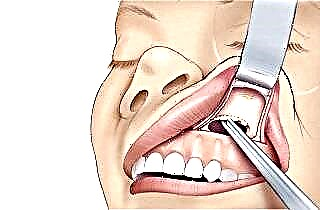Among the diseases that pregnant women are susceptible to, angina is not the last place. This is due to a decrease in immune defense, as a result of which there is an exacerbation of chronic diseases, the development of acute pathology. Throughout the entire period, a woman is more susceptible to infections, therefore, preventive measures must be followed.
 Acute tonsillitis (tonsillitis) is an inflammatory process of infectious origin, localized on the tonsils. In most cases, the palatine tonsils are affected, however, involvement in the pathological process of the lingual, laryngeal, nasopharyngeal is not excluded. The cause of the development of the disease can be viruses, bacterial pathogens. Depending on the cause of the inflammation, the characteristics of the clinical picture, there are:
Acute tonsillitis (tonsillitis) is an inflammatory process of infectious origin, localized on the tonsils. In most cases, the palatine tonsils are affected, however, involvement in the pathological process of the lingual, laryngeal, nasopharyngeal is not excluded. The cause of the development of the disease can be viruses, bacterial pathogens. Depending on the cause of the inflammation, the characteristics of the clinical picture, there are:
- the primary form, when the cause of the disease is pathogenic microorganisms of the bacterial group;
- secondary, which is considered a symptom or complication of another disease, for example, mononucleosis, diphtheria, leukemia;
- specific, the causative agent of which is a specific agent (fungi, spirochete).
Early diagnosis of diseases prevents the progression and development of severe complications.
Reasons for development
Everyone knows that a woman's body undergoes tremendous changes during pregnancy. Reconstruction on the part of the hormonal, immune, cardiovascular systems are aimed at maintaining pregnancy, providing favorable conditions for the growth and development of the fetus.
Suppression of the reactivity of the immune system is necessary to prevent rejection of the fetus, which leads to an increase in the body's susceptibility to infectious agents. In this regard, women quite often suffer from colds, exacerbation of chronic inflammatory, infectious pathology.
In the first trimester, all diseases are rather difficult to carry, it is especially important to prevent the fading of pregnancy, spontaneous abortion, violation of the laying of organs in the fetus, the appearance of congenital anomalies.
The first symptoms and clinical signs of progression
To suspect acute tonsillitis, you are quite attentive to your health. The first manifestations of the disease include:
- increased fatigue, sweating, poor appetite, headache;
- the appearance of puffiness, hyperemia, plaque on the tonsils;
- pain, difficulty swallowing;
- an increase in closely located lymph nodes that are painful on palpation;
- hectic hyperthermia (temperature above 39 degrees).
The temperature in pregnant women should not be allowed to rise above 39 degrees, so the fight against fever must be started at 37.5 degrees.
Now let's analyze the clinical picture depending on the type of inflammation:
- Catarrhal tonsillitis is characterized by superficial lesions of the tonsils (they increase due to swelling, infiltrative processes). Symptomatically, the disease is manifested by subfebrile fever, unexpressed signs of intoxication. With adequate therapy, it is possible to stop the symptoms after 3 days. In the absence of treatment, the following form develops.
- Lacunar, follicular type occur with pronounced manifestations of intoxication. Hyperthermia reaches 40 degrees, cephalgia, angina pectoris, myalgia, arthralgia are worried. In the blood, leukocytosis, neutrophilia, and increased ESR are recorded. The tonsils become edematous, hyperemic, fibrous-purulent discharge is noted in the lacunae, which forms a loose plaque on the surface. In the case of follicular sore throat, suppurative follicles are visible through the edematous tissue, which, after opening, form a surface film.
- Fibrinous - characterized by severe intoxication with possible brain damage, the presence of fibrinous plaque on the tonsils.
- The phlegmonous form is manifested by an abscess, which
 formed as a result of the melting of the tissues of the tonsils on one side. Signs of intoxication are pronounced. Tonsil is tense, painful on palpation.
formed as a result of the melting of the tissues of the tonsils on one side. Signs of intoxication are pronounced. Tonsil is tense, painful on palpation. - Necrotic - manifested by confusion, persistent hectic fever, vomiting. The tonsils are covered with a dull, gray bloom. Attempting to remove the film leaves a bleeding wound. Necrosis extends to the uvula, arch, pharynx.
- The ulcerative film is a consequence of the activity of the spirochete, the spindle-shaped bacillus. Necrosis and ulcers on the tonsils are visually recorded. Symptomatically - putrid odor from the oral cavity, increased salivation, difficulty in swallowing, while the temperature does not rise.
- The herpetic form (most typical for children), its cause is the Coxsackie A virus, which is characterized by a high rate of spread through food, by airborne droplets. In addition to an increase in temperature to 38 degrees, abdominal pain, diarrhea, vomiting, myalgia are observed.
Diagnostics
When contacting an otolaryngologist, the doctor examines the oral cavity, asks for clinical signs. Then the patient is sent for laboratory diagnostics (blood, urine analysis). With the help of pharyngoscopy, the doctor precisely examines the tonsils, surrounding tissues, structures.
Based on the results of diagnostics, treatment tactics are determined, taking into account the duration of pregnancy, the characteristics of the course of the disease.
Treatment directions
How to treat angina in the 1st trimester of pregnancy and in the early stages - the doctor will tell you in detail, since an individual approach is needed. The effectiveness of therapy depends on the stage at which the disease is diagnosed, the regularity of the implementation of medical recommendations. The main areas of treatment are as follows:
- strict bed rest, plenty of drinking, which allows you to accelerate the elimination of toxins from the body;
- dietary food with the exception of solid food in order to avoid trauma to the swollen tonsils, the spread of infection throughout the body;
- antibacterial medicines, selected taking into account the duration of pregnancy, the type of pathogen;
- regular rinsing of the throat (at least 5-6 times a day), necessary to remove pathogenic microorganisms from the tonsils;
- the use of antihistamines, antipyretics (with fever above 37.5 degrees).
Drug therapy
Due to the fact that not all medications are allowed for admission in the first trimester, the selection of medications is carried out exclusively by a specialist.
Treatment of angina during early pregnancy with antibacterial agents begins after confirmation of the diagnosis. Among the permissible drugs are the cephalosporin series, which include Ceftriaxone, protected penicillins (Amoxiclav) and some macrolides, for example, Sumamed. The most commonly used cephalosporins.
For irrigation of the throat and gargling, sprays, solutions with an antiseptic effect, such as Furacilin, Chlorophyllipt, are recommended. In agreement with the doctor, Bioporox is used from time to time, which contains an antibacterial agent. For hyperthermia, paracetamol-based medicines are used. Aspirin is strictly prohibited due to the high risk of fetal abnormalities.
Drinking plenty of fluids helps to flush out toxins. Compote, jelly, fruit drink (except raspberry) are perfect for this.
Traditional medicine help
While taking medications, the use of folk remedies is allowed, but this requires discussion with the attending physician.It is worth noting that hot infusions, foot baths, banks and other procedures involving the use of high temperatures are prohibited for pregnant women.
- If the temperature rises, the use of a dilute vinegar solution is recommended. To do this, you need to combine 100 ml of vinegar and water. A gauze napkin or handkerchief should be moistened with a solution and then applied to the forehead. It is forbidden to compress on a "pregnant" belly. The procedure helps to reduce fever, avoid taking antipyretic medications, but in case of fever above 38 degrees, they must be used at the same time.
- Propolis extract - for gargling (1 tsp tincture in a glass of water). The recipe is suitable for women who are not allergic to bee products.
- To reduce pain, remove plaque from the almond surface, a solution with salt and soda is recommended. 1 teaspoon of the listed components is added to a glass of water, after which it is used for rinsing.
- The preparation Rotokan has a herbal composition (calendula, chamomile, bearberry). It is allowed for rinsing in a dilution of 1 tbsp. concentrated solution in a glass of water. The procedure is repeated every 3 hours.
Among the contraindicated folk remedies, it is worth highlighting sage (due to the risk of spontaneous abortion due to a decrease in the level of progesterone in the blood), linden flowers, raspberry juice (they increase the tone of the uterus, which leads to premature birth).
Complications
A negligent attitude towards one's health leads to the progression of pathology, the development of severe intoxication, the spread of pathogenic pathogens throughout the body with damage to internal organs.
Without adequate treatment, the risk of developing:
- rheumatism;
- kidney damage (pyelonephritis);
- myocarditis (inflammation of the inner lining of the heart);
- meningitis (damage to the meninges);
- pneumonia;
- septic condition.

The listed diseases contribute to the formation of intrauterine defects in the fetus.
Preventive actions
When a woman finds out about pregnancy, she needs to reconsider her lifestyle. Adhering to simple recommendations, it is possible to significantly reduce the risk of developing diseases, to avoid complications from the fetus. Preventive measures must be followed already at the stage of pregnancy planning.
Here is a list of tips to help you avoid sore throats:
- to minimize the frequency and duration of contact with sick people;
- try to use separate dishes, towels and other personal hygiene items;
- wash your hands regularly with soap and water;
- take multivitamins;
- often ventilate the room, carry out wet cleaning;
- dress warmly, avoid drafts;
- use a humidifier;
- during an influenza epidemic, large crowds should be avoided.
In essence, the listed recommendations do not differ from preventive measures for each person. It is especially useful for a woman to attend special courses, the program of which includes gymnastics, swimming, teaching correct breathing and other useful procedures. And remember that the health of the unborn child is in your hands.

 formed as a result of the melting of the tissues of the tonsils on one side. Signs of intoxication are pronounced. Tonsil is tense, painful on palpation.
formed as a result of the melting of the tissues of the tonsils on one side. Signs of intoxication are pronounced. Tonsil is tense, painful on palpation.


